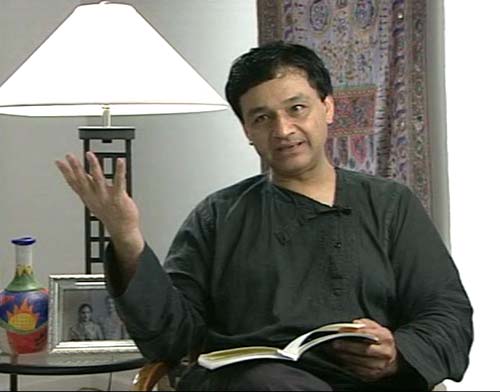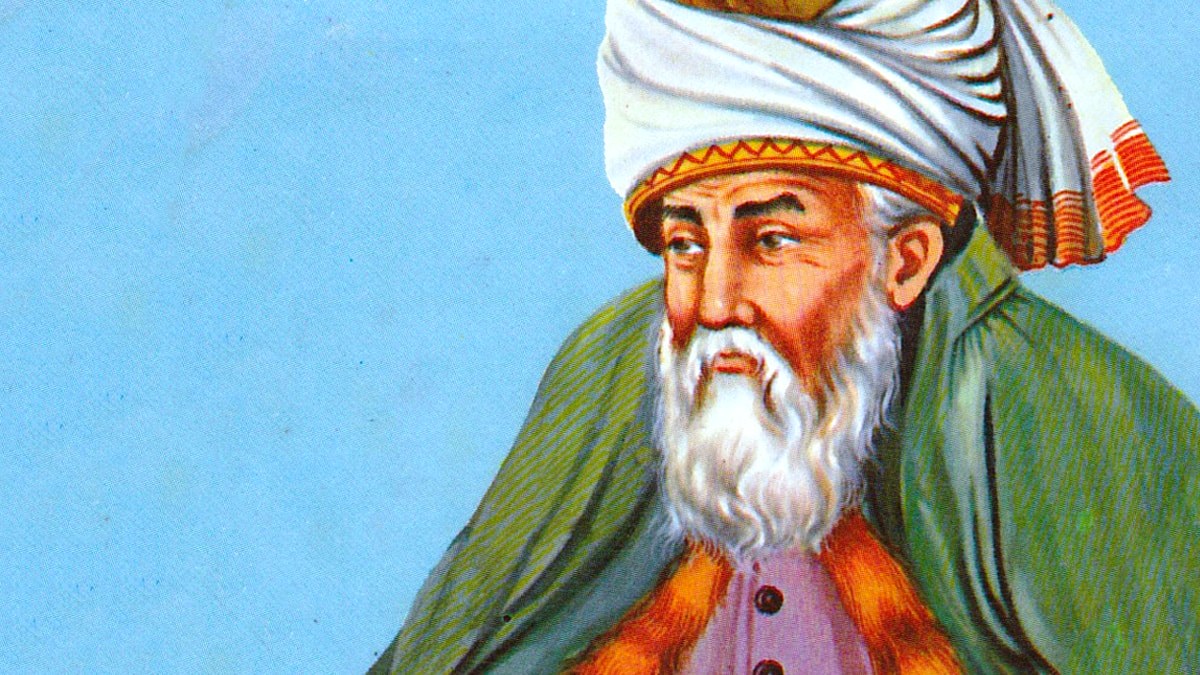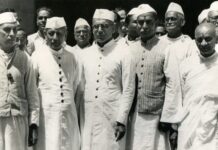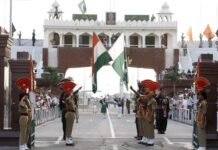Amitav Ghosh referred to Agha Shahid Ali as the ‘closest that Kashmir had to a national poet’. Recently America’s prestigious and largest publishing house, W. W. Norton & Company released The Veiled Suite, a collection of the Agha Shahid’s entire works. This is the highest honour for any poet in the US. Recently, eight world famous poets gathered in New York University to pay their tributes by reciting poems in Shahid’s honour. To follow up the great occasion and commemorate the works and life of our ‘national poet’, Agha Shahid’s best friend Irfan Hassan narrates some memorable moments of Shahid’s life To Kashmir Life’s Majid Maqbool.
Shahid, The Best Friend
As a school boy, I remember going to the house of Agha Ashraf Ali – a friend of my father’s – and finding Shahid working on his typewriter. This is the first memory I have of Shahid. As soon as Shahid saw me, he welcomed me with a big smile. By that time he was already writing. He wrote his first poem when he was 8.
My next meeting with Shahid was in 1988. He was 39 and had already become a published poet, f?ted in American literary circles. It was a hot summer afternoon. I spotted him near Mir Paan House, buying a green-leafed treat. I recognised him instantly as the young boy toiling at the typewriter. With a broad smile – which was his hallmark – he asked me who I was. I introduced myself, and he hugged me. The next day I spotted Shahid opposite Mir Paan House, with two books in his hand. I went across, and he said he was waiting for a friend who hadn’t showed up. He asked me if I was free. I said yes. We went for a walk on the Bund along the Jehlum. Later, I would find out just how much Shahid enjoyed such walks, particularly on the Bund. He would often cross the Jehlum by a shikara to reach his home near Convent school.
After the walk, we sat in a restaurant, La Belle, around Polo view. We had tea and kebabs. He liked kebabs a lot, especially when served with Kashmiri chutneys. During this memorable tea, I discovered Shahid’s poetry. He presented me with two of his books, Half-inch Himalayas and A Walk through the Yellow Pages, which he had been carrying for his friend. On one of them, he inscribed: “For Irfan Hassan, who has become a friend and a wayfarer, quiet unexpectedly and delightfully.” These two volumes are amongst my most treasured belongings.
That very summer, we travelled to Pahalgam. On this excursion, I discovered Shahid as a friend and as an intellectual – “quite unexpectedly and delightfully”. I realized how important this man was. By then, his books were published by W.W. Norton, a prestigious publishing house. Sometimes, his poetry was not easy to understand, however, Shahid would go to great efforts to try and explain its meanings until I understood.
Shahid, The Poet
Shahid weaved different, contrasting poetic styles into his poetry, including the ghazal (Urdu couplets) format and meter. He had mastered the poetic traditions of the West and East and experimented with both, wonderfully. Shahid’s poetry developed into a style and carried a voice that was uniquely his own. He is considered to be one of the greatest modern poets, at once rooted in established literary traditions and ahead of his times.
After a couple of works, he undertook the translation of Faiz Ahmad Faiz into English. Shahid was a close friend of Faiz’ and this translation effort was an act of love. His mother, who was from Lucknow, had deep knowledge of the Urdu language. Whenever Shahid had a problem in understanding the meaning of an Urdu word, she would always be there to assist him. That summer many of the poems were translated in my presence. I remember he would translate one line many times. And then he would be at a loss—which line to choose, which one to drop? He would always try to choose the line that was closest to the literal meaning and that which properly conveyed the intended meaning. He strived to be a messenger of the letter and spirit of Faiz to a new audience and also a bridge between two languages and the cultures they purvey.
Shahid in a 2001 interview with Saudi Aramco World Magazine, expressed his belief that languages mutually enrich each other. “Someone of two nearly equal loyalties”, he wrote about the two languages, English and Urdu, “must lend them, almost give them, to each other, and hope that sooner or later the loan will be forgiven and they will become each other’s.”
Shahid’s mother was a pervasive influence in his life and he was very, very close to her. He loved her deeply. It was through her that he got a real taste for the ghazal. They would spend hours discussing ghazals, and whether the translated verse in English, was able to convey what the poet meant. And if he was unable to capture what the poet wanted to say in the original language, he would become restless. This would be a very testing time for him. He would go up and down the stairs, and write and rewrite and write and rewrite. Sometimes a line would take even three days to complete. This can be seen in his notebooks, where he would write a line fifty times—sometimes even a hundred times—and still would be unable to get the perfect translation. And finally, after three days, he would come up with a line that he was satisfied with. Only once he was able to achieve this, would he be relieved of tension. Shahid took such translation efforts as a great responsibility. A clear example of this obsession with the Urdu language and the struggle to capture its true meaning and shape, can be seen in Shahid’s introduction to The Rebel’s Silhouette: Selected Poems by Faiz Ahmad Faiz. In the introduction, Shahid illustrates how one line can be translated in different ways and how the choice of language and composition of the line can produce multiple and different meanings.
In work after work, the appreciation of the ghazal form is evident in Shahid’s poetry. Shahid once expressed his love for this tradition: “For me, ghazals are first and foremost about my feelings, whether from the distant past or from yesterday, that I need to put into a form with special meaning to me. I want to contain those feelings in a singular way, where I can revisit them again and again. Ghazals were the first poems I ever heard, and the form itself returns so much to me.” A friend and great inspiration, Begum Akhtar, the famous ghazal vocalist, was another important aspect of his life. He took immense pleasure in listening to her music and recited her ghazals often. Friend and writer, Amitav Ghosh, in his tribute to the poet, The Ghat of the Only World, recalls, that it was this relationship with Begum Akhtar that engendered his passion for the ghazal as a verse form.
Shahid, The Person
Shahid was a zealous fan of cinema. We frequented Regal Cinema and Shahid particularly enjoyed watching Bollywood films which exhibited the raw beauty of Kashmir. He loved the films of the 1960’s, generally referred to as the ‘golden sixties’ of Indian cinema, when poets like Sahir and Majruh were at the peak of their creativity and Indian cinema was at its best. Guru Dutt’s films including Sahib Bibi aur Ghulam and Kagaz Kay Phool were two of his favourites. He often detailed how beautifully they were made. He particularly liked Meena Kumari’s role in Sahib Bibi Aur Gulam.
She was his favourite, along with Madhubala. In fact, I remember once we were walking on Residency road, near Biscoe School and he found two huge, black and white posters of Meena Kumari and Madhubala. He brought them and took them along to the US and hung them on the wall of his room.
As much as he relished the golden era of Indian cinema, he equally disliked the turn Indian cinema took after this period. I remember him laughing hysterically at the stupidities that Bollywood had to offer in the 80s and 90s. He would laugh at the typical storylines – when the heroine would be lost and the hero would jump around, and chase the bad guys and beat them up; and also at the low-level quality of songwriting. One song, in particular, amused him a lot: “Chailla babu tu kaisa dildaar nikla, choor samjee thee mae thanaydar nikla.”
Another place he enjoyed to visit was Ahdoos restaurant on the Bund. He would invite friends there, whether an old face or a new one. Shahid was a people person, he delighted in the diversity of his friendships and the people he met. Sometimes, you would find him sitting with 20 people gathered around him and he would entertain all of them. He wanted to talk and listen to fellow Kashmiris, whether known or unknown. He was a very good listener and wanted to hear people’s stories, he yearned to know what had happened in their lives while he was away. It was not like a professor holding a class; he would listen to each and everyone and wanted to know everything about them. In his company, a stranger would become a friend at the first meeting. Social status, education was no criteria for his friendship, and not even age mattered. Anyone could become his friend. He loved to call himself young, all the time.
He came home to Kashmir every year; the only year he didn’t visit was in 1990. When he came home in 1991, he was pained immensely to see how Kashmiris were being treated by the Indian military. His theory was simple: if Bangladesh didn’t want to be part of Pakistan, they were allowed to part. By the same logic, he believed, if Kashmir doesn’t want to be a part of India, India should leave Kashmir. It was simple. He didn’t know what politics was all about. Shahid only felt.
When militancy erupted in 1990, most of the central government offices were left unattended because the majority of staff comprised of Kashmiri Pandits, many of whom migrated. And there was no one there even to distribute posts or deliver letters. One day I happened to visit my local post office in Jawahar Nagar. When I entered the post office, I saw heaps of letters lying unattended. People were walking in and searching frantically for their letters. In one mountain of mail, I found a letter addressed to Shahid’s father. It struck me. And I wrote to Shahid that even to collect letters one has to visit the post office. Later he told me that this was the inspiration behind the title of his most famous and well-known collection of poetry, The Country Without a Post Office, his seminal work on Kashmir.
During his trip to Kashmir in 1991, he composed a poem whilst staying with me: “I see Kashmir from New Delhi at midnight.” This is one of my favourite poems by Shahid. He gave me the first copy of this poem, which is still with me. Those days there were few computers in Kashmir and the only commercial outlet happened to be opposite my house in Jawahar Nagar. We went there and Shahid typed the poem himself and presented the first copy to me. I still have it, framed. When he was away from Kashmir, we used to send letters to each other. He called me regularly to enquire about me, and about the situation in Kashmir. The plight of Kashmir was always on his mind.
Shahid loved traditional Kashmiri architecture. He was concerned about how ugly buildings had come up in place of the old ones and how original Kashmiri architecture, which is so unique, was slowly vanishing. He loved certain buildings, one of them being the Grindlay’s Bank building on the Bund now housing J&K Bank.
Shahid was a simple man, simply dressed, always. In fact, he didn’t know how and where to buy clothes. He was a simple man with simple habits. He was most himself dressed in a t-shirt and a pair of jeans. I haven’t come across such a simple and down-to-earth man in my life.
Many young people would come to him with their poetry; they wanted his advice and guidance. He was never critical, always encouraging and appreciative of their effort of writing. Instead of saying that a particular line was wrong, he would say, “If you write like this, it will convey a better meaning”. Instead of saying something was wrong, he would only say, “You have made a great effort but the form you have chosen is not the right form.”
Shahid was an optimist. Even when he was diagnosed with cancer, he took it so casually as if nothing had happened. And as a person, the disease didn’t change him at all. After the disease was detected, we talked many times over phone. I never knew that the last time we talked would turn out to be his final words to me. He talked cheerfully as usual. He missed Kashmir a lot. By that time he had already gone through many sessions of chemotherapy. But whenever he talked to me, he was so cheerful as if nothing had happened. And we didn’t talk about the disease. He talked about life.
Shahid had pure love for the people of Kashmir, the Kashmiri culture and the uniqueness of Kashmiri language, food, humour – everything that makes a people. He wanted Kashmiri people to love and respect each other. For me, he was not only a best friend but also the greatest modern poet Kashmir has produced. An Indian magazine listed Shahid as one of the ten best post-war poets in the world. He also received worldwide recognition when he was shortlisted for the “National Book Award,” which is America’s highest literary award. Such was his stature in world literature! Unfortunately, and quiet sadly, most of us don’t know about his works. And most of us haven’t even read him. And even today, I am sure the majority of libraries in Kashmir don’t have a single book of Agha Shahid Ali. This sad fact, in a way, conveys why we are in the condition that we are in today.
















